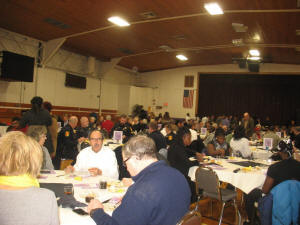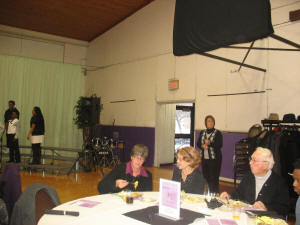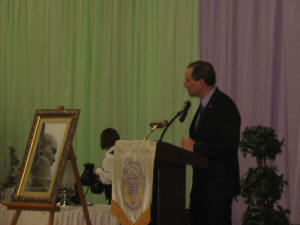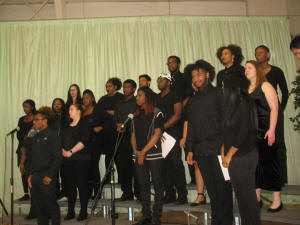|



Attendees were served a large buffet style breakfast followed by a
program of inspirational words and song. The scholarship breakfast
committee consists of the Reverend Glenn Shelton, Les Plotner,
Debbie Ackerman, Ron Keller, and Jen McMillin.


Reverend
Glenn Shelton, a member of the planning committee for the breakfast,
gave the invocation asking God to have his "way in this place
today."

Lincoln
College history professor and Master of Ceremonies Ron Keller
welcomed everyone and thanked all who helped make the event
possible.

Lincoln
College President Dr. David Gerlach said the event started in 2009
as a way to provide funds for a minority scholarship. Last year, the
school was able to endow the scholarship which means it will go on
forever. Over $50,000 has been raised for this scholarship and
Gerlach said "scholarships like this make it possible for so many
students to find success at Lincoln College."

Gerlach showed a video with 1987 Lincoln College graduate and
present member of the board of trustees Phil Stiles, who talked
about the importance of scholarships for helping pave the way for
many to go to college. Stiles said professors and coaches at Lincoln
College taught him a lot about life.

The
2017-2018 Martin Luther King Minority Scholarship recipient is Kayla
Hunt, a Lincoln College sophomore who moved to Lincoln in 2013 and
graduated from Lincoln Community High School. Hunt is enrolled in a
pre-nursing program and has been on the President's List in previous
semesters.
Hunt said she was involved in many activities in high school such as
sports and band, the Future Business Leader's of America Club, the
yearbook staff, and assisting in the office. Discipline, hard work,
encouraging teachers, and inspirational coaches prepared Hunt for
her senior year. Hunt became a manager at Bergner's at age 18.
Hunt recalled that in Martin Luther King's campus newspaper, the
Maroon Tiger, he talked about the purpose of education. King said
"the function of education is to teach one to think intensively and
to think critically." She said Coretta Scott King once stated, "...
the greatness of a community is most accurately measured by the
compassionate actions of its members."
Hunt said Lincoln College's ongoing support of LCHS students is
special and appreciated, and she thanked the scholarship committee,
Lincoln College, and all the community supporters. The scholarship
has enabled Hunt to focus more on her studies.

Hunt closed with a quote from Langston Hughes, "I have discovered in
life that there are ways of getting anywhere you want to go if you
really want to go."
Keller introduced keynote speaker Katherine Harris, who was a
librarian at the Illinois State Historical Library and then the
Abraham Lincoln Presidential Library. Harris has portrayed Harriet
Tubman, Elizabeth Keckley, Sadie DeLaney, and Jarena Lee many times and headed several
organizations including the Illinois Library Association and Abraham
Lincoln Association. She has been dubbed as Illinois' First Lady of
History.

Harris
said it was an honor to speak at the 10th annual breakfast. She
thanked Reverend Shelton for helping establish the breakfast to
honor Dr. King and scholarship recipients. Harris said, what you do
you say on a day set aside to honor Martin Luther King whose life
changed our history and whose legacy lives on throughout the world.
King's name is synonymous with the quest for racial equality,
justice, fairness; and Harris focused on that theme.
[to top of second column] |

Harris said Dr. King was a true believer in the Declaration of
Independence, especially the ideals of freedom, equality,
justice, and humanity of all men. When King spoke on the steps
of the Lincoln Memorial in 1963, he said a promissory note given
to black Americans and presented at the bank of opportunity was
returned and marked insufficient funds. This quickened King's
resolve to fight for equality and justice and became a call to
action.
Harris said in 1955 Dr. King set out to change life in
Montgomery, Alabama and all our hometowns. King embarked on a
long journey towards racial justice, equal opportunity, and
fairness for all, ripe to be picked in the segregated south and
segregated north as well.
Harris said Martin Luther King holiday, established in 1986, is
the first federal holiday to honor an African American. Attempts
to mark the day started at the Southern Leadership Conference in
1971, but failed to get enough support. Supporters persisted and
Illinois was the first state to honor King's Birthday. Former
President Barack Obama was in the General Assembly at the time.
To honor King's memory, his widow Coretta Scott King worked to
have Dr. King's birthplace in Atlanta, Ebenezer Baptist Church
where he served as pastor, and the Martin Luther King Center for
Social Change, recognized by the National Park Service. Ronald
Reagan made Martin Luther King Day a federal holiday in 1986 and
Bill Clinton signed the Martin Luther King Holiday and Service
Act in 1994, proclaiming it a day of community service,
interracial cooperation, and youth anti-violence initiatives. A
national memorial dedicated to King in 2011 is the first to
honor an African American and only the fourth to honor a
non-president in the National Mall in Washington, D.C.
Harris said Martin Luther King is worthy to be honored and is
ranked as one of the most admired and influential people of the
twentieth century. On a Smithsonian Institution list, King is
ranked first in the category of rebels and resistors. He is
fourteenth on the list of the most influential people of all
time, one spot ahead of Abraham Lincoln.

Harris said though Martin Luther King is an "iconic and
historical figure," he "lost the respect and esteem of many of
the American public" during the last years of his life as he
spoke out on issues other than civil rights. King spoke out
against economic, social, political, and moral injustices facing
the poor, immigrants, and marginalized people in society, but
was rebuked by many.
January 8th, President Donald Trump expanded the boundaries of
King's National Historic Site to include the Prince Hall and
Masonic Temple King spoke at. Harris said the action was ironic
in light of Trump's much discussed comments later in the week.
Harris said King authored five books and gave over 450 speeches,
and reflected on several of King's quotes. In April 1967, King
said in his sermon "Beyond Vietnam: A Time to Break the Silence"
that seeing black and white boys killed together on the nightly
news in a faraway nation that cannot seat them together at the
same school is unconscionable.
After Bloody Sunday in March 1965, King stood on the steps of
the state capitol in Alabama and said, "Like an idea whose time
has come, not even the marching of mighty armies can halt us. We
are moving to the land of freedom." King's refrain was "how
long, not long" and his words “the arc of the moral universe is
long, but it bends toward justice" were borrowed from activist
Theodore Parker.
In a July 1965 speech, King referred to his 1963 "I Have a
Dream" speech and said the dream had become a nightmare. Just a
few days later, the nightmare ended as Lyndon B. Johnson signed
the voting rights act with King there to witness it.
Harris said in 1952, King wrote that he was more socialistic in
economic theory than capitalistic and felt justice could not
come without radical changes in our society's structure. King
thought power and wealth should be shared by blacks and whites.
As Harris closed, she encouraged everyone to read King's works
and be moved to action and inspired to serve. She ended with
King's quote, "Everybody can be great because anybody can serve.
You don't have to have a college degree to serve. You don't have
to make your subject and verb agree to serve. You only need a
heart full of grace. A soul generated by love."


As the
Second Baptist Youth Choir prepared to take up a collection for the
Scholarship Fund, Reverend Shelton spoke of serving through giving.
Everyone joined the choirs in singing "We Shall Overcome" as the
collection was taken.


During
the morning's program, the Second Baptist Youth Choir also sang
"Break Every Chain" and "God is Keeping Me," and the Lincoln College
Chorale performed "Up to the Mountain."

Reverend
Shelton closed the morning's events with a benediction asking for
blessing on this institution of higher learning, Dr. Gerlach, and
its faculty and staff, so the students may increase their learning
and take reigns of leadership.
[Angela Reiners]
|